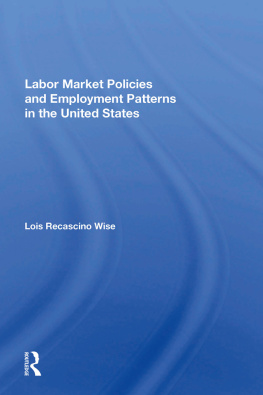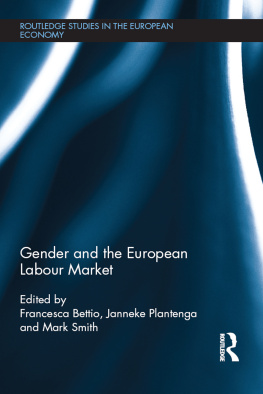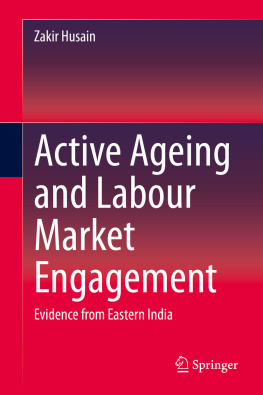WORKING SCHEMES?
For Rosemary, Rair and Larry,
Frank and Annie.
Working Schemes?
Active Labour Market Policy in Ireland
PHILIP J. OCONNELL
FRANCES McGINNITY
First published 1997 by Ashgate Publishing
Reissued 2018 by Routledge
2 Park Square, Milton Park, Abingdon, Oxon OX14 4RN
52 Vanderbilt Avenue, New York, NY 10017
Routledge is an imprint of the Taylor & Francis Group, an informa business
Copyright Philip J. OConnell and Frances McGinnity 1997
All rights reserved. No part of this book may be reprinted or reproduced or utilised in any form or by any electronic, mechanical, or other means, now known or hereafter invented, including photocopying and recording, or in any information storage or retrieval system, without permission in writing from the publishers.
Notice:
Product or corporate names may be trademarks or registered trademarks, and are used only for identification and explanation without intent to infringe.
Publishers Note
The publisher has gone to great lengths to ensure the quality of this reprint but points out that some imperfections in the original copies may be apparent.
Disclaimer
The publisher has made every effort to trace copyright holders and welcomes correspondence from those they have been unable to contact.
A Library of Congress record exists under LC control number:
ISBN 13: 978-1-138-35984-0 (hbk)
ISBN 13: 978-1-138-35989-5 (pbk)
ISBN 13: 978-0-429-43253-8 (ebk)
Contents
We are greatly indebted to our colleague, Jerry Sexton, at the Economic and Social Research Institute, for his guidance on the research design and questionnaire, and for his meticulous comments on a number of drafts of earlier versions of the book. We gratefully acknowledge Maureen Lyons many contributions to the project including: assistance with questionnaire development, monitoring of the processing of the completed questionnaires, and preparing the data for analysis. We thank Brendan Whelan and his very able staff at the ESRI Survey Unit who took over responsibility for collecting and processing the data. We owe a particular debt of gratitude to the more than 3,700 individuals who took the time to answer our very detailed and intrusive questionnaire. We wish to thank our colleagues Alan Barrett, Brian Nolan and Chris Whelan for searching comments on earlier drafts and for their ongoing encouragement. We also wish to thank the staff of the general office, particularly Pat Hopkins for her cheerful help with reproduction of both the questionnaire and many drafts, and Maura Rohan, the Librarian at the ESRI who always met our requests for yet more literature with good humour and commendable efficiency. Finally, we wish to acknowledge funding for the original survey upon which this book is based from the Irish Department of Enterprise and Employment, and the European Commission, DG V, Employment, Industrial Relations and Social Affairs.
Active labour market policies have moved to centre stage in the European Commissions strategy to combat unemployment, and such policies now account for very sizeable and growing expenditures in most European countries. Do these programmes work? In fact, there is considerable controversy about the impact of active labour market policies in combating unemployment or even improving the employment prospects of those who participate. It is a controversy which exercises academic researchers and is observed closely by policy makers. The debate has attracted the attention of The Economist, which reviewed the literature in a recent leading article and reached decidedly pessimistic conclusions regarding the potential of such policies.
In a growing body of research, economists have compared groups of unemployed people who enter government training schemes with similar groups who do not. In almost every case, these studies have found that the schemes have failed to improve either the earnings or the employment prospects of their clients.
The Economist, April 6, 1996
Such a pessimistic assessment calls into question the entire strategy embodied in active labour market policies. In terms of social policy, it suggests that active labour market policies are failing to achieve their intended objective of reducing social exclusion. Moreover, given the growth in public expenditure on such policies, it raises serious concerns about the returns to what is now a very substantial investment.
Our objectives in writing this book are two-fold; one practical, one more academic. First, as social scientists working in Ireland, with its history of mass unemployment, we are vitally interested in whether training and employment schemes offer a solution to unemployment, and in identifying what kinds of programmes are most effective in assisting the unemployed to find work. Second, as labour market analysts seeking to understand the workings of the labour market, we are interested in assessing the impact of state intervention. Faced with the stark assessment referred to by The Economist, we ask whether all active labour market policies are doomed to failure, or do some programmes work better than others? In seeking an approach to the problem we differentiate between programmes in terms of basic underlying labour market processes, between supply and demand measures, and in terms of the nature of the linkages between programmes and the market.
The principal concern of this book is with the impact of active labour market policies on the employment prospects of their participants in Ireland. Ireland has suffered from mass unemployment since the early 1980s, with chronic unemployment of young people and one of the highest rates of long-term unemployment in Europe. It is one of the leading countries in the world in the share of its national income devoted to active policies. It operates a wide range of differing programmes catering to a diversity of target groups. In 1994, the numbers participating in active labour market measures represented 6.5% of the entire labour force and 40% of total unemployment. Since the late 1980s Ireland has invested heavily in active labour market policies under the tutelage of the European Commission and supported by very substantial funding from Brussels. Ireland is, therefore, a particularly good test case in which to examine the impact of such policies and to assess the efficacy of the policy prescriptions which dominate the official response of the European Commission to unemployment.
In we trace the evolution of active labour market programmes from their early origins in Sweden as a solution to the inflationary problems associated with full employment during the post-war boom, to their widespread adoption as a solution to mass unemployment throughout the industrialised countries since the 1970s. This, of course, raises the question of whether policies originally designed to manage full employment and rapid economic growth can be expected to resolve the problems of mass unemployment and sluggish economic growth.
At the micro level, with which we are principally concerned, our survey of the international literature on the effectiveness of active labour market programmes on the employment prospects of their participants shows a great deal of confusion, with empirical results often appearing to contradict each other. While some studies conclude that training and employment schemes have a positive impact on their participants subsequent employment prospects, others fail to find any significant impact on employment probabilities.








